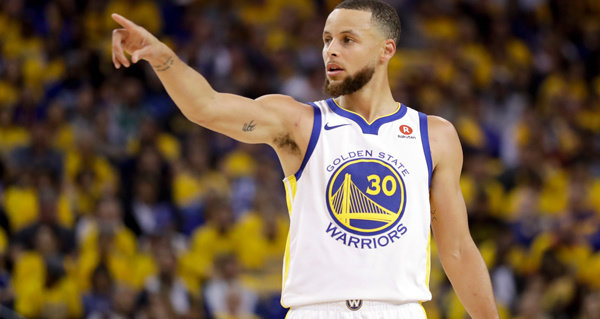Well, that was a long walk to get to where we thought we’d end up: Golden State lazing their way, a little bit shakily, through the regular season and getting pushed to the brink by a Rockets team that might have beaten them had Chris Paul not pulled his hamstring, and Cleveland, suffering even worse than their usual winter turmoil, coming out the other side of it severely altered but also not in the sense that the entire mechanism still revolved, as it always has, around LeBron James, who has assembled maybe the greatest playoff run of all-time—for naught because, almost anyone could have told you in October, the Warriors have too much talent to blow this thing. Three out of four championships is one win away, and it’s hard to see the Cavs putting up much of a fight on Friday night in Game 4.
The Western Conference Finals shouldn’t be glossed over. Houston pinned Golden State as close to the ropes as they’ve been since Kevin Durant joined last summer, but there was the sense, as the Warriors were on the verge of getting knocked out of the playoffs, that to an extent their predicament was their own doing. And they could extricate themselves from it if they could find even just their B-plus game. So they did. Could they have pulled it off with a healthy Chris Paul kicking around? Certainly, but perhaps they wouldn’t have.
The Cavs are not on the Rockets’ level and exist only within shouting distance of the Warriors. You would have to run this simulation many, many times before the Cavs would eke out a seven-game victory. LeBron would have to average, what, 45-13-11 over the four wins? And Steph Curry would have to have how many poor shooting nights? An injury or suspension might have to be involved. It’s no better than faintly plausible. LeBron is a miracle worker, but George Hill and Jeff Green are plainly ordinary.
The Warriors operate against the Cavs—against basically everybody—with a broad margin for error, and they’ve driven that point home over three contests by really only having one great night. In Game 1, Kevin Durant needed 23 shots to score 29 points and Golden State got killed on the glass, 53 to 38. In Game 3, Curry and Klay Thompson combined to shoot 7-for-27 from the field. It didn’t end up mattering. They had enough to win anyway.
We’ve been having the debate for nearly 24 months now, whether or not the Warriors are good for the NBA, to the point that it’s not an interesting question anymore, having been answered from every angle: arguments for greatness and historic feats and against stacked decks, accusations of cowardice, explanations from Warriors fans that their franchise has been woeful forever and they’re just trying to enjoy this dynastic spell however long it lasts. You stand where you stand on it; you’re not required to feel a certain way. It’s possible many non-partisans no longer feel much of anything at all about it. You eat the same dinner enough evenings in a row and your taste for it deadens.
For my part, I spent most of this NBA season seeking new questions. I watched more Wizards and Bucks and, inexplicably, Mavericks games than usual. When buzz occasionally intensified that the Warriors looked a whit vulnerable, I would check in on them, and they invariably looked fine—bored more than anything, which I resented them for because they brought malaise upon themselves. But whatever, I would go back to wondering if the Wizards could do any better than Tomas Satoransky and Mike Scott off the bench, what the Bucks would look like with a decent coach. Scouting the NBA’s middle- and lower-classes can be fun because you’re off in a quieter corner of the basketball world, out of earshot of the broader discourse’s more obnoxious voices. The game is less mediated, but you’re also watching deficient squads that can frustrate and underwhelm. I like Andre Drummond a lot, but his immense talent is blighted by flaws.
And of course, whether you tune in to five regular season Warriors games or fifty, in the end, you discover they’ve been the year’s triumphant protagonists all along. It would be weird if they weren’t. This is a way of complimenting them—they are staggeringly loaded—and also saying that there’s been nothing in their path that they haven’t been expected to overcome. Falling to the Rockets would have been a colossal failure. Losing to the Cavs would have been framed as LeBron’s astronomical achievement but also would have been embarrassing for Golden State. Those are the stakes, as they’ve been set—were set two summers ago, and haven’t since moved.
It’s obviously not easy for the Warriors to function as they’re supposed to. Kevin Durant doesn’t drop 43 points in a Finals game because he’s Kevin Durant—it’s the culmination of a life spent in the gym, of punishing summer conditioning regimens and tedious drills. That goes for Curry and Thompson and Green and the rest. But the fact is, they don’t need to work as hard as they do, play as well as they can. As currently constituted, they have yet to be pushed to their absolute limit. They’re superior to the rest of the league. They’re probably very proud of that. It’s the definition of a deserving champion, isn’t it? As an accomplishment, it’s major. As an entertainment, as something that truly awakens the sense and rattles the nerves, it lacks. This isn’t the Warriors’ problem, but it is firmly ours, because we’re here to be entertained, more than to witness something firmly within the bounds of our imagination. The long walk, as ever, has been worth it. Another rich and involving and fraught NBA season more or less well-spent. This ending, though: exactly what we weren’t looking forward to.



